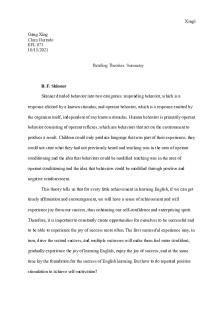Keohane Reading Notes - Summary After Hegemony PDF

| Title | Keohane Reading Notes - Summary After Hegemony |
|---|---|
| Author | Robbie Campbell |
| Course | International Politics |
| Institution | The London School of Economics and Political Science |
| Pages | 2 |
| File Size | 54.2 KB |
| File Type | |
| Total Downloads | 50 |
| Total Views | 134 |
Summary
Summary of keohane intro...
Description
Wednesday, 25 April 2018
After Hegemony Reading Notes Subject
• GOING TO NEED GOOD DEFINITIONS OF INSTITUTIONS; CONTRAST KEOHANE’S INSTITUTIONS AND BULL’S!!
- This book is about how cooperation has been and can be organised in the world political economy when common interests exist.
- Assumes that mutual interests exist; examines the conditions under which they lead to cooperation
- Focuses on advanced market-economies because common interests are manifold between these states - exist in a state of interdependence
- International politics is anarchic in the sense that it lacks an authoritative government that can enact and enforce rules of behaviour. States must rely on the means they can generate and the arrangements they can make for themselves. Conflict and war result since each state is judge in its own cause and can use force to carry out its judgements. The discord that prevails is accounted for by fundamental conflicts of interest - Waltz view on anarchy
• Keohane says were neorealist views correct any cooperation would be derived from overall patterns of conflict. Institutionalised patterns of cooperation on the basis of shared purposes wouldn’t exist in such a world - we observe extensive patterns of international agreement that such a theory doesn’t account for.
- Keohane also critiques institutionalists! He says they are naive about power and conflict, and they are excessively optimistic about the role of ideals in world politics. They say interdependence is a solvent of conflict and creator of cooperation.
- Both neorealists and institutionalists made the same predictions based on different models; Rs saw US hegemony as underpinning cooperation, and Is saw institutions as facilitating cooperative spill over
- Since 1960s there have been signs of decline in the efficacy of cooperative efforts - as American power eroded so international regimes.
- K postulates whether cooperation can exist after hegemony; After US decline there can be a period of discord and then a more symmetrical cooperative regime can emerge. He begins with realist insights, but his central argument draws from the instituionalist tradition, arguing that cooperation can under certain conditions develop on the basis of complementary interests and that institutions affect the patterns of cooperation that emerge. 1
Wednesday, 25 April 2018
- K doesn’t foresee a world where hegemony is likely to emerge again; sees war as a precondition for hegemony.
- Ch 3 examines HST, Ch 4 - He has loads of definitions in the intro, go through and find summaries of what he’s saying about them.
2...
Similar Free PDFs

Pop Culture Hegemony
- 2 Pages

Ryle reading summary
- 1 Pages

Reading Summary 2
- 1 Pages

Reading Summary 3
- 6 Pages

Reading Theories Summary
- 4 Pages

Reading Summary Lesson 1
- 1 Pages

Malcolm X Reading Summary
- 1 Pages

Reading Summary - Ch. 2
- 3 Pages

Academic essay hegemony
- 2 Pages

Ir100 essay - Hegemony essay
- 5 Pages

Seminar Reading Summary
- 8 Pages
Popular Institutions
- Tinajero National High School - Annex
- Politeknik Caltex Riau
- Yokohama City University
- SGT University
- University of Al-Qadisiyah
- Divine Word College of Vigan
- Techniek College Rotterdam
- Universidade de Santiago
- Universiti Teknologi MARA Cawangan Johor Kampus Pasir Gudang
- Poltekkes Kemenkes Yogyakarta
- Baguio City National High School
- Colegio san marcos
- preparatoria uno
- Centro de Bachillerato Tecnológico Industrial y de Servicios No. 107
- Dalian Maritime University
- Quang Trung Secondary School
- Colegio Tecnológico en Informática
- Corporación Regional de Educación Superior
- Grupo CEDVA
- Dar Al Uloom University
- Centro de Estudios Preuniversitarios de la Universidad Nacional de Ingeniería
- 上智大学
- Aakash International School, Nuna Majara
- San Felipe Neri Catholic School
- Kang Chiao International School - New Taipei City
- Misamis Occidental National High School
- Institución Educativa Escuela Normal Juan Ladrilleros
- Kolehiyo ng Pantukan
- Batanes State College
- Instituto Continental
- Sekolah Menengah Kejuruan Kesehatan Kaltara (Tarakan)
- Colegio de La Inmaculada Concepcion - Cebu




